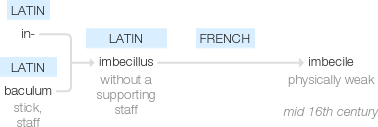Imbecile
mid 16th century (as an adjective in the sense ‘physically weak’): via French from Latin imbecillus, literally ‘without a supporting staff’, from in- (expressing negation) + baculum ‘stick, staff’. The current sense dates from the early 19th century.
wiktionary
From Middle French imbécile, from Latin imbēcillus(“ weak, feeble”), literally “without a staff”.
etymonline
imbecile (adj.)
1540s, imbecille "weak, feeble" (especially in reference to the body), from French imbecile "weak, feeble" (15c.), from Latin imbecillus "weak, feeble," a word of uncertain origin.
The Latin word traditionally is said to mean "unsupported" or "without a walking stick" (Juvenal: imbecillis: quasi sine baculo), from assimilated form of in- "not, opposite of" + baculum "a stick" (see bacillus), but Century Dictionary finds that "improbable" and de Vaan finds it "very far-fetched" and adds "it seems to me that exactly the persons who can walk without a support are the stronger ones." There also are phonological objections.
Sense shifted to "mentally weak or incapable" from mid-18c. (compare frail, which in provincial English also could mean "mentally weak"). As a noun, "feeble-minded person," it is attested from 1802. Traditionally an adult with a mental age of roughly 6 to 9 (above an idiot but beneath a moron).
